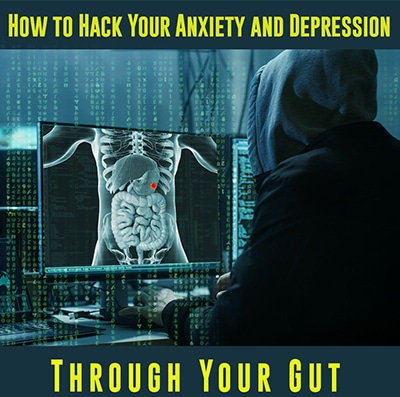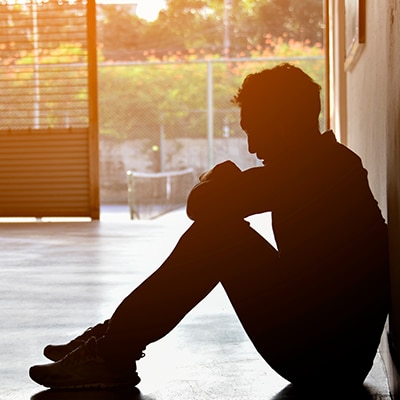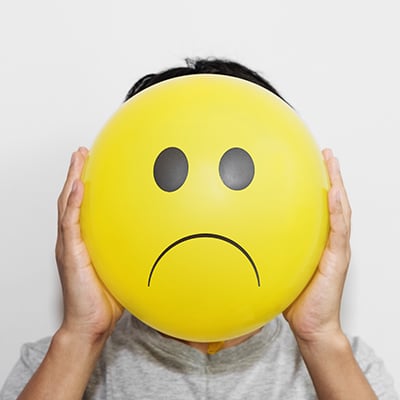How to Hack Your Anxiety and Depression Through Your Gut
We’ve always been told both anxiety and depression are disorders of your brain, and the way to fix them is through modifying brain chemicals.
But what if that isn’t the way to fix it?
What if that’s just a band-aid covering the wound and hiding it away?
What if the problem is starting where you get that first ball of discomfort — deep down in the pit of your stomach.
You know that age-old advice of, “listen to your gut intuition”?
Well, you may want to listen to your gut when it comes to anxiety and depression as well.
What Are Anxiety and Depression?
For those of you that have never experienced an anxiety attack or a depressive state, it is really hard for you to understand the complexity of these disorders.
Anxiety
Everyone will experience anxiety to some degree in their lifetime.
Those butterflies in your tummy before a first date or when you pitched your first baseball game — those are a form of minor anxiety.
Anxiety disorders are a whole different ball game.
Anxiety disorders will take that feeling and magnify it to the point of physical sickness.
Some common symptoms of anxiety disorders include:
- Irritability
- Restlessness
- Fear
- Fatigue
- Sleep-related issues — excessive tiredness, inability to sleep
Depression
Everyone has felt sad at some point. Your crush turned you down, you didn’t get the job you wanted, or someone you love passed away. This will all cause sadness — sometimes for weeks or months.
Depression is, again, totally different. It’s like you’ve been sucked into a cave at the depths of your mind, you’re in a straight jacket of doom, and you can’t see light anywhere.
Depression is an overwhelming, all-consuming darkness that is hard — almost impossible — to escape.
Some common symptoms of depression include:
- Overwhelming feelings of sadness or worthlessness
- Loss of interest in activities
- Appetite change — extremely hungry or disinterested in food
- Inability to concentrate
- Thoughts about death/suicide
Are Anxiety and Depression the Same Thing?
In short, no. While they tend to have very similar symptoms they aren’t the same problem.
Sometimes one can cause the other or they can coexist in the same person — ½ of people diagnosed with depression are also diagnosed with some form of anxiety disorder — but they aren’t the same problem by any means.
Anxiety is more worry focused and depression is overwhelming feelings of grief.
The Vagus Nerve: The Main Highway Between Your Gut and Brain
Your vagus nerve is the main link in the gut-brain connection. The vagus nerve deals with controlling your mood, immune response, digestion, heart rate, and fear responses.
The vagus nerve is stimulated by:
- Relaxation techniques
- Vagus nerve stimulation techniques
- Nutrients from food
Your microbes take the nutrients from your food and change them into useful byproducts like hormones, fatty acids, neurotransmitters, and other molecules.
These byproducts then are sent out to do their different jobs throughout the body. Some are sent back to the vagus nerve to relay information up to your brain.
Gut Manipulation of the Brain
Now that you know the path, you should know some more about the stimulants that are causing the bad communications.
Gut Peptides
We could probably create 10 articles on gut peptides and still not cover all of the information. Here are some basics on how they might be the source of your dismay.
- Peptides are a form of hormone that play a huge role in anxiety and depression
- Many peptides are found along the entire length of the Gut-Brain Axis and are able to cross the blood-brain barrier allowing them to influence both the gut and the brain
- Peptides can have neuroprotective, neuroinflammatory, and/or neurogenesis type of effects
- Gut-derived short-chain fatty acids influence that number of peptides available for different tasks
Oxytocin and Serotonin
Both oxytocin and serotonin are considered to be happy chemicals. Stress, puberty, pregnancy/childbirth, and other factors can throw these chemicals out of balance.
- Oxytocin has been shown to have anti-depressant and anti-anxiety qualities.
- Serotonin has an effect on different bowel disorders.
- With constipation, serotonin levels are lower.
- With diarrhea and celiac disease, serotonin levels tend to run higher.
- In IBS-D patients, serotonin platelet levels had a direct correlation with symptom severity.
- Serotonin is one of the best ways to see the gut-brain connection since about 90% of your serotonin is gut-generated.
- Use of different serotonin forms is one of the most common ways depression is currently being treated
Leaky Gut and Mental Health
With increased permeability, bacteria are able to travel places they shouldn’t be which allows it to makes changes to chemical homeostasis.
The path of destruction from a leaky gut:
Leaky gut → increased immune responses → chronic inflammation
Chronic inflammation is the basis for many different autoimmune and psychological diseases.
Insomnia, Depression, and Anxiety: A Tiring Cycle
You can’t sleep because of your anxiety or depression, but what if you have depression and anxiety because you aren’t sleeping?
New mothers and shift workers are perfect examples of this cycle in effect. They don’t get much sleep and so they become irritable and have higher chances of depression and anxiety.
Lack of sleep leads to reduced immunity allowing for stress to take a toll on your body easier than it normally would.
Stress creates a leaky gut which creates disease through chronic inflammation.
How to Stop the Craziness Within Your Body
There are obviously a ton of factors at play when it comes to these debilitating diseases.
Here are a few ways to combat these problems:
Diet
Switching to more of a Mediterranean style diet may help decrease your symptoms.
By eating more fresh, real foods full of dietary fiber and polyphenols and low in unhealthy fats, your microbiome is able to begin to heal and from there so can your body.
Including foods like cucumber, lamb, mint, oregano, and wild trout that are high in omegas 3 and 6 are also a great way to help fight depression and keep it at bay.
Prebiotics
Prebiotics are supplements that contain indigestible fiber that allow your body to heal itself. Atrantil is a great source of prebiotics and polyphenols.
Also, Atrantil’s ingredients have anti-inflammatory properties that help to fight inflammation in your gut and throughout your body.
Probiotics/Fermented Foods
Probiotics are live strains of bacteria that you ingest to increase your defenses.
Probiotics are good for some people and not so good for others, so speak with your doctor before adding them into your routine.
Numerous studies have been done on the effects of probiotics on depressive and anxious patients and almost all have come back with positive results.
Fecal Microbiota Transplantation
While this sounds gross, it has really great and promising results. In studies done on animals, fecal microbiota transplantation was able to reverse both anxiety and depression.
Speak with your doctor to see if this may be a route you can take for your anxiety and depression to heal yourself from within.
Exercise
Exercise has been proven to change your gut bacteria, reduce systemic inflammation, and increase the production of those happy chemicals throughout your body.
Going for a walk or some yoga might do the trick to help your body and mind get back on track.
Both of these diseases are awful to live with, but you do have options!
Even if you don’t feel like walking or eating an apple or doing anything at all, one step at a time will help.
Reach out to your support system for help. Don’t be afraid to ask for help when you need it.
You aren’t weak, you aren’t a burden.
You are human and it’s okay that you aren’t perfect, because none of us are.
What are some ways you like to get yourself out of suffering from these mind plagues?
Share them in the comments section below to help other readers out!
To recap How to Hack Your Anxiety and Depression Through Your Gut
watch our video below:



I have bloating for probably 25 years. Have had MRI/Cat scans. I went gluten free, egg free,Turkey and corn free but still suffer every day. Any advise would be greatly helpful.